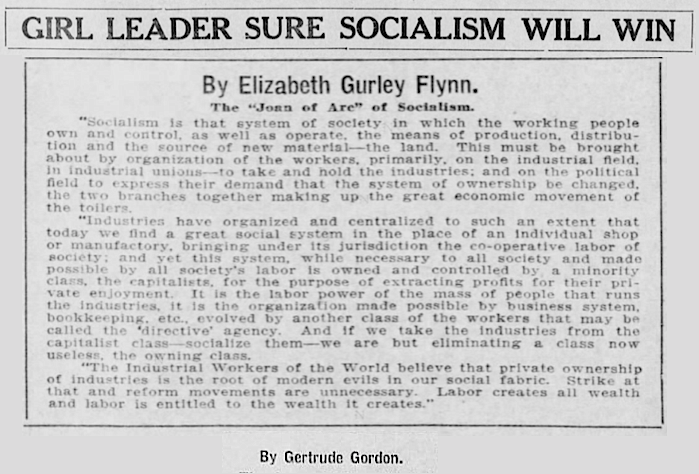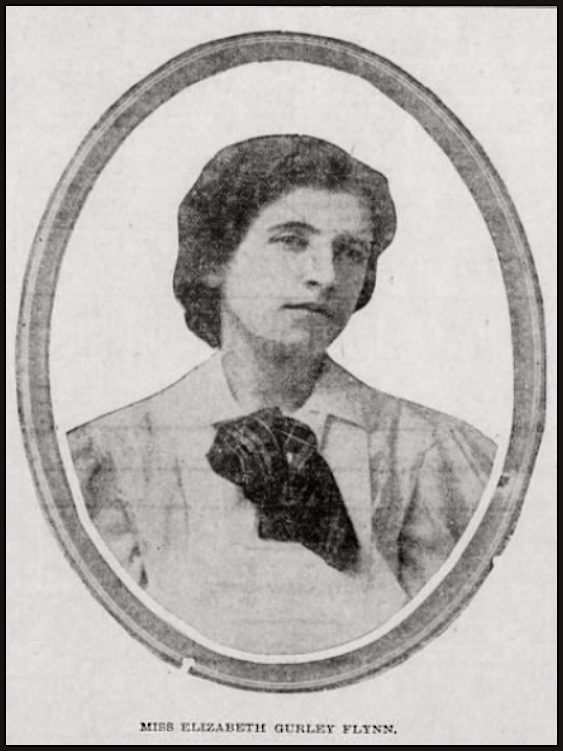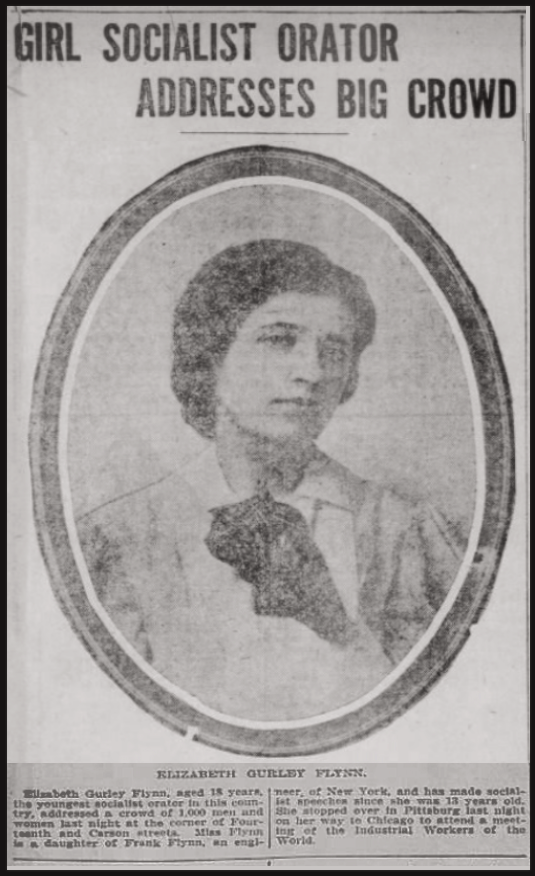 ~~~~~~~~~~~~~~~~~~~~~~~~~~~~~~~~~~~~~~~~~~~~~
~~~~~~~~~~~~~~~~~~~~~~~~~~~~~~~~~~~~~~~~~~~~~
Hellraisers Journal – Monday September 28, 1908
Pittsburg, Pennsylvania – Elizabeth Gurley Flynn Talks of Socialism
On their way to Chicago to attend the Convention of the Industrial Workers of the World, Elizabeth Gurley Flynn Jones and her husband, J. A. Jones, stopped off at Pittsburg where Gurley Flynn was interviewed for the Pittsburg Press regarding her views on Socialism and Suffrage.
From The Pittsburg Press of September 27, 1908:
The force of Miss Elizabeth Gurley Flynn’s personality impresses one the first five minutes one talks to her. This girl Socialist leader is not wildly enthusiastic nor does she “rant” as would be expected of a young, prominent, Socialistic leader, but there is a quiet, compelling strength about her words and herself that claims and holds the attention immediately.
She was completely tired out the morning I went to see her, while she was on a visit recently to this city, it being after a very strenuous night, when she spoke for two hours and a half to about 2,000 people.
“It was a splendid meeting,” she told me in her quiet way, and her eyes shone. “I was completely carried away by my audience and really spoke longer than I intended, but it is worth getting tired for.”
Miss Flynn is, of course, very confident that ultimately the Socialist party will rule.
[She averred:]
It cannot help but come into power for when one looks around and sees the general condition of affairs, one cannot but see that something is terribly wrong. And it isn’t in the law of things that wrong shall always endure. The world proper belongs to the working people; they do the work and keep it up and of course they should have the benefit of their labors. Under present conditions this is impossible, so the only remedy is to have a new system.
The idea of Socialism is very simple, but oh, it involves so many other things that the end is never reached. The idea is not too ideal to be put into practice, as some people think; but one needs to readjust one’s own ideas to see Socialism from a correct view-point. We have been living so long with the thought that the world should belong to a very few, that it is hard to accustom ourselves to the knowledge that it should and must and will belong to the many.
EIGHTEEN YEARS OLLD.
Miss Flynn celebrated her eighteenth birthday only last month. She is really pretty without one artificial or fashionable aid to make her so. Her hair is dark, parted on one side and drawn back smoothly and severely into a knot at the nape of her neck. Her eyes are dark blue and very large, with long lashes and straight brows. They are set far apart, and a well-shaped brow rises above them-the brow of a thinker and a student. Her lips are firm and prettily modeled, with a firm set to them that harmonizes with the determined chin below them. Her face has the soft flush of a girl, while her manner is the embodiment of the gentle dignity of a woman. Her articulation is distinct and low, her every tone showing her familiarity with the platform. She wore a simply made dark blue flannel shirtwaist suit. She has been speaking since she was 15 years old.
[In telling how she came to take up her present work, she said:]
I was very ill the year before I was 15 and was in the house all that time, so of course read and studied a great deal. My father was very radical in his views, having been connected with a number of minor reform movements, and of course he drew quite a large coterie of radicals around him, and I heard their conversations and thought deeply about what I heard. My mother was also interested in reforms.
To finish matters just about that time my father, who was a civil engineer, was cheated out of almost two years’ pay, after he had worked faithfully for it. You can imagine that left us in rather severe straits, and it set me to thinking that in a country where such a thing could happen to a man, there must be something wrong. Well, I just naturally drifted from that line of thought into Socialism, and soon became an active member.
I was born in Concord, N. H., but have lived in New York a great part of my life, and it seems like home there. Last January I married John A. Jones, from Duluth, Minn. We intend to make our home in the West.
Mrs. Jones, or Miss Flynn, as she prefers to be called in anything that concerns her work, was here under the auspices of the Industrial Workers of the World.
AS TO WOMEN VOTING.
Upon my asking her what she thought of women voting, she said:
Now I hardly know what to say about that. I do not think it would do the country very much more good to have women vote, for the majority of them would only go the way the men of the family went, anyhow. A woman has not the time nor the opportunity to go down deeply enough into political questions to be entitled to a vote. Now, my idea is that if she can become identified with a labor union or organization, she will learn more about her country than just to have the blind power put into her hands to cast a vote. Theoretically suffrage is all right, but practically I do not see that it amounts to much.
Now, the women who are working for suffrage are all right, but I do not think they do the right way about getting it. They strike at effects, not causes. Now take the temperance question for instance; they try to stop people from drinking; why not remove the cause that impels them to drink. The way some of the working people have to live and the wages they receive and the lives they are forced into is enough to drive them to drink. I don’t blame them; it is the only pleasure some of the poor wretches have. Now make the conditions surrounding them better and they will have an opportunity to make happy homes for themselves and surround themselves with better influences, and the reason for drinking will be gone. Is it not logical?
And one thing also I have noticed about different speeches made by women for the cause of suffrage. They take up this idea alone, that a woman who could vote would be entitled to more favors in the political and social world than she is now. That is, if she had a vote, more positions would be open to her and she could demand more from the ruling powers. In a word, she could sell her vote, just as lots of men do. Where, I ask is the good results that could accrue from a condition like that? Only aggravate the present condition of affairs. Another thing women preach that “Legislation means Education.” Look around you at the men you see who may vote and tell me if voting means their improvement. No, I think there is more for women to do than just vote.
———-
From The Pittsburg Press of September 17, 1908:
—–
Elizabeth Gurley Flynn, aged 18 years, the youngest socialist orator in this country, addressed a crowd of 1,000 men and women last night at the corner of Fourteenth and Carson streets. Miss Flynn is a daughter of Frank [Thomas] Flynn, an engineer of New York, and has made socialist speeches since she was 13 years old. She stopped over in Pittsburg last night on her way to Chicago to attend a meeting of the Industrial Workers of the World.
~~~~~~~~~~~~~~~~~~~~~~
SOURCE & IMAGES
The Pittsburg Press
(Pittsburg, Pennsylvania)
-Sept 27, 1908
https://www.newspapers.com/image/142163029/
-Sept 17, 1908
https://www.newspapers.com/image/142149067/
See also:
The Rebel Girl
-by Elizabeth Gurley Flynn
International Publishers, 1973
https://libcom.org/history/rebel-girl-autobiography-my-first-life-1906-26
https://books.google.com/books?id=JawEAQAAIAAJ
Note: EGF identifies her father as “Thomas Flynn” with photo, page 27.
Note: See page 86 for EGF making her way to IWW Convention in Chicago.
https://libcom.org/files/rebel-girl-autobiography.pdf
~~~~~~~~~~~~~~~~~~~~~~~~~~~~~~~~~~~~~~~~~~~~~
All Hell Can’t Stop Us – Twin Cities Labor Chorus
Lyrics by Ralph Chaplin
https://play.google.com/books/reader?id=vTlRAAAAYAAJ&printsec=frontcover&pg=GBS.PA16



